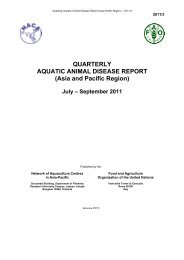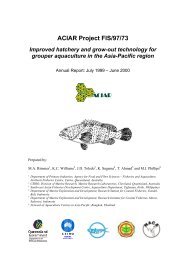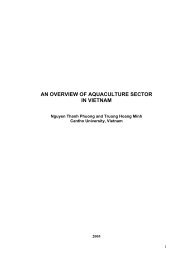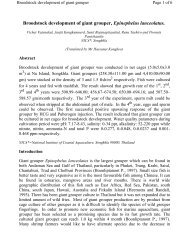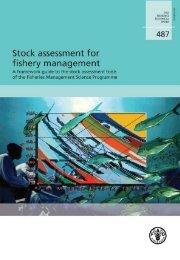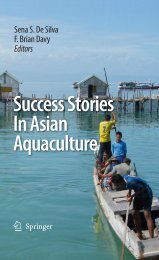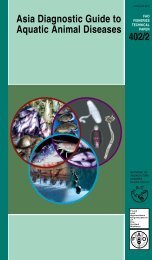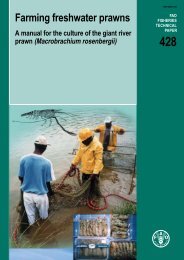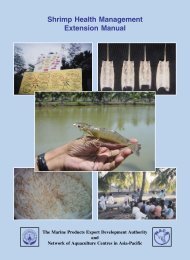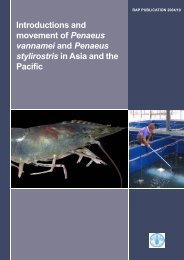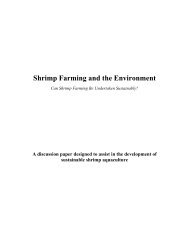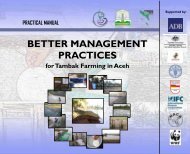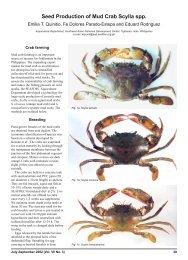take <strong>in</strong> to consideration <strong>of</strong> the women needs like schedul<strong>in</strong>g the tra<strong>in</strong><strong>in</strong>g that is convenient to them, arrang<strong>in</strong>g thevenue that is closer to their families, needs <strong>of</strong> the children when mother has to attend the tra<strong>in</strong><strong>in</strong>g, etc.(Nandeesha et.al., 1994; Nandeesha, 2004) Most importantly, the educational level <strong>of</strong> women <strong>in</strong> most <strong>of</strong> thecountries be<strong>in</strong>g low , the tra<strong>in</strong><strong>in</strong>gs need to consider this aspect and organize tra<strong>in</strong><strong>in</strong>gs that provide an opportunityto learn by do<strong>in</strong>g. Considerable success has been achieved <strong>in</strong> design<strong>in</strong>g the tactile tools to educate men andwomen with low literacy level or illiterates <strong>in</strong> Bangladesh (Shelly, et.al, 2001; Debashish, et.al., 2001).(b) Enhance access to water resourcesLandless women were encouraged to undertake cage farm<strong>in</strong>g <strong>of</strong> fish by creat<strong>in</strong>g an opportunity to have access toopen water bodies <strong>in</strong> Bangladesh. This was considered as one <strong>of</strong> the major accomplishments s<strong>in</strong>ce <strong>in</strong> Bangladeshthere are many open water bodies that can be made available. However, this cage culture activity is yet to beseen as a susta<strong>in</strong>able activity be<strong>in</strong>g carried out by women due to various other social and technical constra<strong>in</strong>ts.Women were also successfully organized <strong>in</strong> to groups and encouraged them to undertake aquaculture activity bytak<strong>in</strong>g ponds on lease (Nathan and Apu, 1998). Though <strong>in</strong>itially many hurdles were faced to procure access towater, consistent efforts have led to <strong>in</strong>volve them actively <strong>in</strong> pond culture programs <strong>in</strong> Bangladesh. In thisconservative society, today many women can be seen <strong>in</strong>volved <strong>in</strong> pond fish culture activity, particularly <strong>in</strong> carry<strong>in</strong>gout all the activities by themselves from stock<strong>in</strong>g to harvest<strong>in</strong>g and market<strong>in</strong>g. In most cultures, land ownership isheld by men. Though this cultural pattern will require time and appropriate policy changes to give ownership toboth men and women, the major hurdle faced <strong>in</strong> many areas for aquaculture development is the multipleownership <strong>of</strong> pond and multiple use <strong>of</strong> pond. Development <strong>in</strong>terventions must take these factors <strong>in</strong> toconsideration and <strong>in</strong>troduce appropriate technologies that will survive under these circumstances.(c) Enhance access to credit<strong>Aquaculture</strong> activity to be successful, provision <strong>of</strong> adequate <strong>in</strong>put is critical. While some on-farm resources couldbe used <strong>in</strong> aquaculture, considerable amount <strong>of</strong> <strong>of</strong>f-farm <strong>in</strong>put needs to be purchased <strong>in</strong> most cases. Hence,provision <strong>of</strong> credit along with appropriate tra<strong>in</strong><strong>in</strong>g is essential to ensure that family derives benefits from theactivity. Self help groups established <strong>in</strong> many Asian countries have contributed very effectively to aquacultureactivities. Keep<strong>in</strong>g the groups <strong>in</strong>tact over longer period <strong>of</strong> time and develop<strong>in</strong>g leaders to take on the leadershipare the major constra<strong>in</strong>ts. In addition, aquaculture crops <strong>in</strong> most cases requir<strong>in</strong>g longer growth phase, most creditsystems available <strong>in</strong> different countries do not suit well to aquaculture crops. In Bangladesh, efforts have beenmade to evolve credit systems that take <strong>in</strong> to consideration <strong>of</strong> this longer gestation period <strong>of</strong> crops (Nandeesha,2004).(d) Enhance access to female extension staffTo <strong>in</strong>crease communication between women farmer and the extension personnel, it is recognized that <strong>in</strong> manycultures that it is desirable to have women staff. Large scale experimentation by CARE Bangladesh <strong>in</strong> theconservative Society by aim<strong>in</strong>g to have almost 1:1 ratio <strong>of</strong> male and female extension staff resulted <strong>in</strong> the highlevel impact <strong>of</strong> the project programs. Particularly, <strong>in</strong> the conservative areas, hav<strong>in</strong>g female staff helped <strong>in</strong> a bigway to change the perception <strong>of</strong> the people. While hav<strong>in</strong>g gender balanced staff is bound to help <strong>in</strong> many waysand it is essential, the experience <strong>of</strong> the CARE projects <strong>in</strong> Bangladesh <strong>in</strong>dicate that once the confidence <strong>of</strong> thecommunity is ga<strong>in</strong>ed, both men and women extension person are accepted by the community and women willhave no difficulty to share the <strong>in</strong>formation with men (Debashish, et. al., 2001)(e) Change <strong>in</strong> organisational cultureMost organizations are dom<strong>in</strong>ated by men and many <strong>of</strong> them are yet to be aware <strong>of</strong> the gender issues because <strong>of</strong>the cultural <strong>in</strong>heritance, particularly <strong>in</strong> Asia. As a result, with lack <strong>of</strong> knowledge and experience <strong>in</strong> gender, genderbl<strong>in</strong>d policies and <strong>in</strong>terventions are common. Even <strong>in</strong> Philipp<strong>in</strong>es, Thailand, Vietnam where<strong>in</strong> women constitute135
major percentage <strong>of</strong> staff, the need for gender sensitive policies and actions is felt. Hence, to br<strong>in</strong>g change <strong>in</strong> anorganizational environment, it is necessary that top management must be educated on gender and constantefforts should be made to develop gender sensitive policies and programs to address the issues confront<strong>in</strong>g thesystem. CARE Bangladesh management recognized this as an organizational issue and <strong>in</strong>troduced policies toensure not only gender balanced staff recruitment, but also make conscious efforts to ensure gender is part <strong>of</strong> allprojects (Debashish, et.al., 2001). When women extension staff were recruited and given small bike to reachvillages, these staff were faced with many challenges s<strong>in</strong>ce men did not want to see the women driv<strong>in</strong>g the bike.Constant support from the management helped the staff to overcome the problem and today driv<strong>in</strong>g a vehicle bywomen <strong>in</strong> rural Bangladesh is no longer considered as an uncommon activity.Benefits from the <strong>in</strong>creased participation <strong>of</strong> women <strong>in</strong> aquacultue(a) Enhanced social status <strong>of</strong> womenParticipation <strong>of</strong> women <strong>in</strong> aquaculture activities is generally not viewed as a womanly activity, particularly <strong>in</strong> many<strong>of</strong> the conservative societies <strong>of</strong> South Asia. In this cultural context, <strong>of</strong>ten women are not even targeted by variousagencies, assum<strong>in</strong>g that aquaculture is an activity for men to be carried out by men. In Bangladesh, efforts madeby a number <strong>of</strong> NGOs have contributed for a major change to <strong>in</strong>clude women <strong>in</strong> aquaculture activities. Acquisition<strong>of</strong> knowledge and skill and active participation <strong>in</strong> aquaculture activities have changed the status <strong>of</strong> women with<strong>in</strong>the family as well as <strong>in</strong> the society. However, <strong>in</strong> these conservative societies, <strong>in</strong> the early stages, their participation<strong>in</strong> aquaculture was viewed negatively and heavily criticized. Persuasion with the community leaders and familiesto participate <strong>in</strong> this activity that can be carried out most easily has resulted <strong>in</strong> good output (Debashish et.al.,2001).(b) Improved position <strong>of</strong> women <strong>in</strong> the family:When women acquire knowledge and skill on aquaculture and contribute to family <strong>in</strong>come, it has been seen thatthe position <strong>of</strong> women <strong>in</strong> the family improves visibly (Vimala, et.al., 2004). Women <strong>in</strong> Bangladesh <strong>in</strong>volved <strong>in</strong>culture <strong>of</strong> freshwater prawn depended on men <strong>in</strong> the family to manage the ponds before they acquired knowledgeand skill <strong>in</strong> the area. However, once the women participated <strong>in</strong> the learn<strong>in</strong>g sessions and ga<strong>in</strong>ed practical skills,they were viewed more as equal contributors to family <strong>in</strong>come by men <strong>in</strong> the family (Nandeesha, 2004). Further,once the women were able to carry out the activity <strong>in</strong>dependently, they also began to ga<strong>in</strong> control on the <strong>in</strong>comeearned and decide on the way the resources spent on the family improvement. In the Oxbow lake project too, itwas observed that once women were able to <strong>in</strong>itiate aquaculture activity and earn <strong>in</strong>come, their position <strong>in</strong> thefamily changed. Women were able to buy the personal and family necessities us<strong>in</strong>g the resources available attheir discretion. In several <strong>in</strong>stances <strong>in</strong> Cambodia, women had ga<strong>in</strong>ed substantial voice <strong>in</strong> the family managementwith the extra <strong>in</strong>come they could earn through <strong>in</strong>volvement <strong>in</strong> aquaculture (Nandeesha, et.al., 1994).(c) Improved nutrition <strong>of</strong> the family:Involvement <strong>of</strong> women <strong>in</strong> aquaculture has always ensured higher priority for consumption <strong>of</strong> the fish producedfrom the backyard pond for consumption with<strong>in</strong> the family. This has been very common <strong>in</strong> Cambodia wherewomen themselves could harvest fish by us<strong>in</strong>g simple nets like hook and l<strong>in</strong>e, scoop net, drag net, etc.Considerable portion <strong>of</strong> the harvested fish was shared with relatives and friends. Such distribution <strong>of</strong> valuable fooditem like fish also has contributed for the enhanced image <strong>of</strong> the family <strong>in</strong> the community. In the cage cultureproject <strong>in</strong> Bangladesh, women who were actively <strong>in</strong>volved <strong>in</strong> cage management always ensured, harvested fishutility for family consumption. Cage culture <strong>of</strong> fish also provided an opportunity to treat guests and relatives byeasily harvest<strong>in</strong>g fish from cages without depend<strong>in</strong>g on men <strong>in</strong> the family. Women have expressed great <strong>in</strong>terest<strong>in</strong> manag<strong>in</strong>g cages by plac<strong>in</strong>g them <strong>in</strong> ponds located close to the houses or <strong>in</strong> open water bodies close to theirplace <strong>of</strong> residence.136
- Page 1 and 2:
Training of TrainersProgramme3-7 Au
- Page 3 and 4:
Table of Contents1. Preface 42. Sen
- Page 5 and 6:
knowledge about the activities carr
- Page 7 and 8:
iosphere, in that it is essentially
- Page 10 and 11:
Importance in narrowing the supply
- Page 12 and 13:
Figure 7: The trend in aquaculture
- Page 14:
aquaculture has been a success thus
- Page 17 and 18:
pathogen transfer is generally cons
- Page 19 and 20:
• It highlights the importance a
- Page 21 and 22:
particular animal are identified, t
- Page 23:
Knowledge at the bottom of the pyra
- Page 26 and 27:
farmer innovation process. In this
- Page 28 and 29:
• Rapport building• Working str
- Page 30 and 31:
shrimp farming is undertaken in the
- Page 32 and 33:
Reintjes, C and Hiemstra, W. 1989 F
- Page 34 and 35:
• An increase in reliable product
- Page 36 and 37:
Principles of AACC are to: 1) Facil
- Page 38 and 39:
Maintaining genetic quality of fish
- Page 40 and 41:
Where F is the percent increase in
- Page 42 and 43:
o G=(0.95) 1/10G =0.994883803Figure
- Page 44 and 45:
Aquaculture extension and training
- Page 46 and 47:
ResearchExtensionFarmersFlow of inf
- Page 48 and 49:
view of outside world than before a
- Page 50 and 51:
Along with fish sample, the support
- Page 52 and 53:
Fungal examinationFungal infection
- Page 54 and 55:
few different pathogen strains. The
- Page 56 and 57:
Major finfish diseases in Asia and
- Page 58 and 59:
A great number and diversity of ani
- Page 60 and 61:
• -oxidase test positive• -resi
- Page 62 and 63:
ReferencesAustin, B. and D. Austin.
- Page 64 and 65:
Accessing better markets-improving
- Page 66 and 67:
Owing to its importance in generati
- Page 68 and 69:
adopt standards for responsible shr
- Page 70:
Tokrisna R, Benheam W., 1995. Gain
- Page 73 and 74:
of the temperature rise that were d
- Page 75 and 76:
Principles of developing, validatin
- Page 77 and 78:
such as determinants, exposures and
- Page 79 and 80:
How to promote adoption of BMPs?Pro
- Page 81 and 82:
economic sustainability. BMPs need
- Page 83 and 84:
Once you understand your stakeholde
- Page 85 and 86: As conventional approaches such as
- Page 87 and 88: Printed publicationsPrinted publica
- Page 89 and 90: Set up a blog or website for your w
- Page 91 and 92: If you have a website, all you need
- Page 93 and 94: ought about increased profits among
- Page 95 and 96: • It is a farming system the prod
- Page 97 and 98: Annex 1. The area surveyed for obta
- Page 99 and 100: contribute substantially to maintai
- Page 101 and 102: seawater, but in fresh water its le
- Page 103 and 104: type of ingredients used, since som
- Page 105 and 106: This is a new approach used to buil
- Page 107 and 108: New, M.B., A. G. J. Tacon and I. Cs
- Page 109 and 110: later stages it has become a much m
- Page 111 and 112: c. Improved information exchange an
- Page 113 and 114: implemented by both societies. Inte
- Page 115 and 116: With better informed farmers, the s
- Page 117 and 118: According to FAO, it is estimated t
- Page 119 and 120: Farmer organization as models for p
- Page 121 and 122: NaCSA disseminates BMPs mainly thro
- Page 123 and 124: 1. Drain the pond water completely
- Page 125 and 126: Seed transportation and Stocking:
- Page 127 and 128: 7. Presently 100% of the society po
- Page 129 and 130: would help in sustaining shrimp sec
- Page 131 and 132: Stress brought about by the capture
- Page 133 and 134: Enhance women participation in aqua
- Page 135: women in aquaculture and identify a
- Page 139 and 140: having more self confidence through
- Page 141 and 142: Overall status of men and women in
- Page 143 and 144: Compliance to international standar
- Page 145 and 146: (ii) to protect human or animal lif
- Page 147 and 148: c) FAO/WHO Codex Alimentarius Commi
- Page 149 and 150: Annex 1: List of participantsCountr
- Page 151 and 152: Annex 2: AgendaDate Time Presentati
- Page 153: Annex 3: List of resource persons1.



